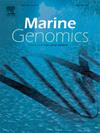从南极洲分离的产蛋白酶的雪旺氏菌 H8 的完整基因组序列
IF 1.5
4区 生物学
Q4 GENETICS & HEREDITY
引用次数: 0
摘要
广谱变形菌类中的雪旺菌属细菌广泛分布于海洋环境中。从南极洲纳尔逊岛采集的红藻样本中分离出了 Shewanella sp.在此,我们展示了菌株 H8 的完整基因组序列,它由一条单环染色体组成,包含 4,490,743 个核苷酸,其中 G + C 含量为 40.59%,不含任何质粒。共获得 3983 个蛋白质编码基因、95 个 tRNA 基因和 25 个 rRNA 基因。菌株 H8 的基因组分析表明,它含有 4 种冷激蛋白和 3 种脂肪酸去饱和酶,并具有合成 hglE-KS、芳基聚烯、betalactone 和 RiPP 类化合物的潜力。通过基因组注释,在菌株 H8 的基因组中发现了 91 个蛋白酶编码基因。根据其催化类型,这些蛋白酶被分为六类。在这些蛋白酶中,金属蛋白酶和丝氨酸蛋白酶占主导地位。这些蛋白酶可通过降解环境中的蛋白质为 H8 提供碳源和氮源。这项研究将为今后研究和开发适应寒冷的蛋白酶提供潜在的遗传信息。本文章由计算机程序翻译,如有差异,请以英文原文为准。
The complete genome sequence of proteases-producing Shewanella sp. H8 isolated from Antarctica
Bacteria of the genus Shewanella in the class Gammaproteobacteria are widely distributed in marine environments. Shewanella sp. H8, was isolated from a red algae sample collected from Nelson Island, Antarctica. Here, we present the complete genome sequence of strain H8, which consists of a single circular chromosome comprising 4,490,743 nucleotides with 40.59 % G + C content without any plasmid. In total, 3983 protein coding genes, 95 tRNA genes, and 25 rRNA genes were obtained. Genomic analysis of strain H8 showed that it contains four cold shock proteins and three fatty acid desaturases and possesses the potential to synthesize hglE-KS, arylpolyene, betalactone and RiPP-like compounds. Through genomic annotation, 91 protease-encoding genes were identified within the genome of strain H8. These proteases are classified into six categories based on their catalytic types. Among these proteases, metalloproteinases and serine proteases are dominant. These proteases may provide carbon and nitrogen sources to H8 by degrading proteins in the environment. This study will provide potential genetic information for the future research and development of cold-adapted proteases.
求助全文
通过发布文献求助,成功后即可免费获取论文全文。
去求助
来源期刊

Marine genomics
生物-遗传学
CiteScore
3.60
自引率
5.30%
发文量
50
审稿时长
29 days
期刊介绍:
The journal publishes papers on all functional and evolutionary aspects of genes, chromatin, chromosomes and (meta)genomes of marine (and freshwater) organisms. It deals with new genome-enabled insights into the broader framework of environmental science. Topics within the scope of this journal include:
• Population genomics and ecology
• Evolutionary and developmental genomics
• Comparative genomics
• Metagenomics
• Environmental genomics
• Systems biology
More specific topics include: geographic and phylogenomic characterization of aquatic organisms, metabolic capacities and pathways of organisms and communities, biogeochemical cycles, genomics and integrative approaches applied to microbial ecology including (meta)transcriptomics and (meta)proteomics, tracking of infectious diseases, environmental stress, global climate change and ecosystem modelling.
 求助内容:
求助内容: 应助结果提醒方式:
应助结果提醒方式:


